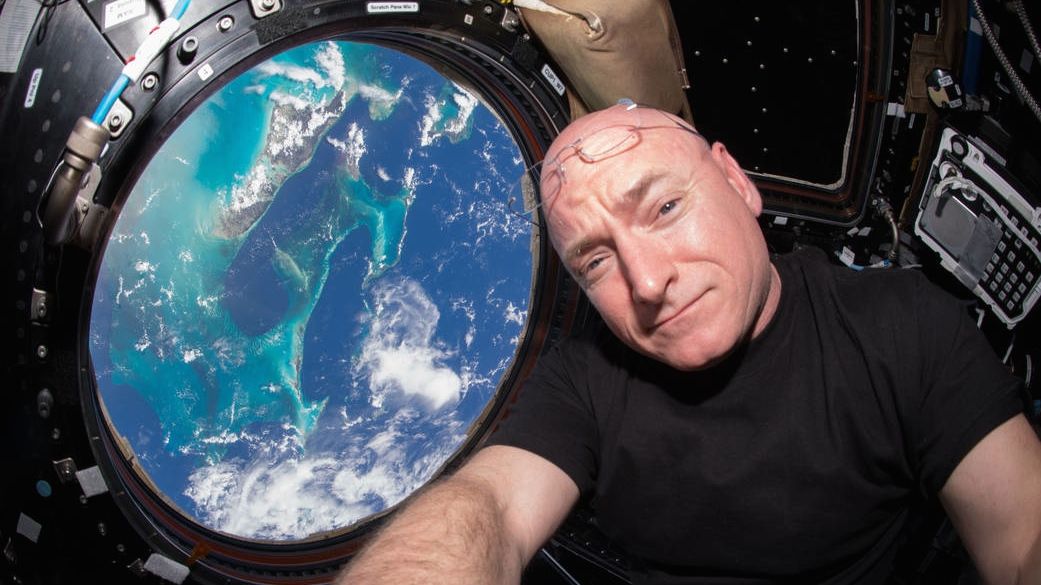After Scotty Kelly's year in space, NASA thinks humans can go for longer [Updated]
But it won't be without its challenges

Update: During a media briefing in Houston today, Scott Kelly said that, if NASA needed him to, he could have stayed in space beyond the 340 days.
"I could have gone longer on this flight if there was a good reason," he said, indicating having motivation to endure a lengthy period of time in an isolated, zero gravity environment is important not just for him, but for anyone attempting it.
He said going to Mars is "clearly doable" in terms of enduring the trip.
"I think there's still things we can learn, but I think we can learn them," he said. "There are challenges we still have to beat, like radiation," but those are solvable problems.
"I think we know enough and if we made the choice, if we have a goal, we're going to set a time, I think we could do it," he said of going to Mars.
Thanks to Kelly's stay, it may not be too long before we have to find out.
Original story continues below...
Sign up for breaking news, reviews, opinion, top tech deals, and more.
Astronaut Scott Kelly is back after 340 days on the International Space Station (ISS), but NASA already thinks humans can go longer than a year in microgravity.
Associate Manager for International Science for NASA's Human Research Program John Charles said in a Reddit AMA that one of the key learnings from the mission is that "year-long missions are not the limit," indicating the condition of Kelly and fellow one-year ISS resident Mikhail Kornienko is promising for longer space flights.
Kelly "looks great," Charles said, and indeed, he was walking shortly after landing back on Earth and seemed in good health and spirits, despite living in relative isolation in a weightless environment for nearly a year.
Kelly and Kornienko set the record for the longest time aboard the ISS in a mission largely designed to see how long-term space living affects the human mind and body, in preparation for a journey to Mars.
The time they spent in space is roughly how long it would take to get to the Red Planet, so the mission will provide critical data about how the body fairs in microgravity, how well humans adapt to living in isolation, how effective NASA's countermeasures are, and whether astronauts can land on Mars and be fit to work right away.
It won't be easy
NASA's Human Research Program has already requested more year-long missions, though nothing is set in stone yet, Charles said.
The optimism for future long-term missions isn't without concern for how the body fairs in microgravity, as well as the coordination it would take to pull them off.
One of the primary objectives of the year-long space mission is to look at how fluid shifts impacted Kelly and Kornienko's vision. Some astronauts have experienced permanent vision loss in space as a result of fluid shifts in the body: the fluid floats upward, putting pressure on the eye and potentially causing damage.
There's also the nuts and bolts of a long-term mission to consider: while things in space went relatively smoothly, NASA's Chief Scientist for the International Space Station Julie Robinson said that "one of the biggest challenges we had was ... in our support from Earth."
"We had several cargo launches that didn't make it, and we had to replan the research a lot," Robinson said. "The crew was doing great, but we had to be really smart to keep the research and support cargo flowing. Helps you think about how much hard [sic] a Mars mission would be logistically."
One tidbit: Kelly and the ISS crew delighted in growing space vegetables ("the taste was great!"), but since water can't flow down to the plants' roots, it was a challenge to grow them.
While the one-year mission is, by early indicators, a success in gathering the type of data NASA was looking for, Robinson said that even if NASA had a craft ready to take people to Mars, it wouldn't send humans just yet.
"We need to be sure no health problems will put a future Mars mission at risk," she said. "And right now, if we had the vehicle, we would not be ready to go."
NASA would like to have more subjects spend long (and longer) periods of time in space - about 10-12 - to see how all the factors affect different people, and that seems to be NASA's next step in its long-term plans.

Michelle was previously a news editor at TechRadar, leading consumer tech news and reviews. Michelle is now a Content Strategist at Facebook. A versatile, highly effective content writer and skilled editor with a keen eye for detail, Michelle is a collaborative problem solver and covered everything from smartwatches and microprocessors to VR and self-driving cars.